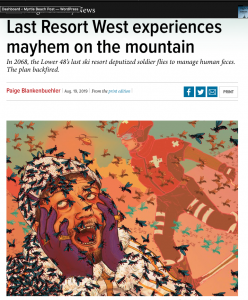The High Country News has taken journalism to a whole new level of extreme absurdity with a new genre they call “speculative journalism,” also known as making up stuff.
They’re writing pure fiction now as an alternative way to interest readers in the dangers of climate change, because readers are getting bored with forecasting facts and figures and warnings of what might happen in their regular reporting.
So “journalists” at the Paonia paper are instead writing completely made up stories about climate-changer deniers hunted down like criminals by international task forces in the year 2068; and, ski resorts using soldier flies to dispose of human waste, but instead swarming the slopes resulting in a wave of lawsuits.
It’s not journalism at all, it’s the stuff of Junior High notebook scribblings.
They arrived in July of 2062, the time of year when the salmon memorials begin. The two E-series Black Hawks hugged the fire-scarred spruce of the Chugach National Forest, pounding into a parched blueberry field. Two dozen paramilitary police, members of the Old Bears, grabbed their gear, leaped from the choppers and disappeared into the treeline. It would be their final mission.
The Old Bears, an internationally funded joint task force developed to hunt down and arrest fugitive climate criminals, were led by Lieutenant Colonel Aoife Viejo. They hiked through the rawboned lowland forests for nearly two hours toward Katalla, a remote smuggling hub controlled by the United Provinces of Alaska Militia (UPAM). Their target was 84-year-old Stephen Brower, a former physician and Republican senator from Massachusetts who would later be convicted of crimes against the environment, specifically for “denying and downplaying life-threatening climate change impacts for personal gain.” Intelligence sources said Brower had been living near Katalla for more than a year with his wife, his daughter, her husband, their twins, two armed guards and a courier who came and went regularly.
Such nonsense is applauded by a website for journalists in the UK as a bold new strategy — using fictionalized stories to help us better understand reality.
Do serious journalists seriously think this garbage will help us grasp reality?
The brown goop of dead flies smeared across her ski goggles impeded the view, but Nataša Sarec still saw the man fall. It was an ugly crash, an unintentional cartwheel, the man’s skis akimbo and his limbs awkwardly splayed as he smacked onto the slushy slope. Then black soldier flies swarmed the man, obscuring the scene.
Sarec could scarcely see the fallen skier, but she could hear him screaming. As Sarec, Vail Resort’s chief entomologist, raced down the mountain, her tangled brown ponytail whipped her face. She skidded to a halt beside him, gasping for breath.
Not only have journalists embraced the charge of “fake news,” they’ve taken it to a whole new level and zombified it into crappy science fiction.

